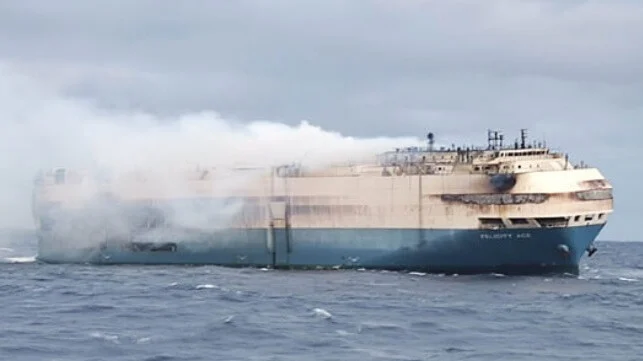Japanese shipowner Mitsui O.S.K. Lines (MOL) stased that it has decided to install cameras and an AI system developed by Israel-based Captain’s Eye in the cargo holds of most of its LNG-fuelled car carriers to provide early fire detection capabilities.Knowing that fires at sea are extremely dangerous and also one of the main contributors to casualties, the shipping industry is looking for new solutions to deal with the dangers of out-of-control fires, especially those caused by electric vehicles and lithium-ion batteries.

Currently, all of MOL’s car carriers are equipped with fire alarms based primarily on smoke detectors. Despite the measures that have been taken to enhance fire prevention, catastrophic losses continue to occur. on February 16, 2022, MOL’s car carrier Felicity Ace caught fire approximately 90 nautical miles south-southwest of Faial, an island in the central Azores, and sank approximately 220 nautical miles off the coast of the Azores in the morning of March 1, 2022, local time. In the morning of March 1, 2022, the vessel sank approximately 220 nautical miles off the coast of the Azores, with tugboats unsuccessful in extricating it from the wreckage and the 22 crew members on board rescued. At the time of the incident, the ship was carrying more than 4,000 vehicles, including Porsche, Volkswagen, Lamborghini, Bentley and Audi, and the economic damage is estimated to be in excess of $400 million.
While the cause of the fires has not been identified and electric vehicle manufacturers do not believe their vehicles pose a greater risk, battery fires do present a unique set of challenges.
According to the Best Practices and Recommendations for the Safe Transportation of Electric Vehicles, published by the International Union of Marine Insurance (IUMI) in September of this year, the total energy released during a fire in an electric vehicle is only marginally different from that released during a fire in a vehicle with an internal combustion engine. However, because electric vehicles have the potential for thermal runaway (when the battery undergoes an unstable chemical reaction), new firefighting technologies are needed to address this issue. Thermal runaway makes fires difficult to extinguish, and mitigation measures such as boundary cooling must be taken quickly. In addition, there is a higher risk of re-ignition over a prolonged period of time.
MOL said it will install an artificial intelligence system developed by Captain’s Eye on 10 new liquefied natural gas-fueled (LNG) car carriers currently on order. The ships will begin commissioning in 2024, with plans to retrofit the system on the current vessels. A March 2023 report from MOL showed that the company currently has 96 car carriers and plans to grow to 120 in the segment.
MOL has currently conducted demonstration tests with Captain’s Eye to explore the smoke detection capabilities of the AI system. The system has been used to detect anomalies in the engine room and on the deck, and is in use on merchant ships and other vessel types, including yachts, around the world. In collaboration with Captain’s Eye, MOL has improved the system’s functionality and confirmed its effectiveness through several tests, including the successful detection of small amounts of smoke.
The system will analyze images captured by cameras mounted around the ship’s car deck. Once an image anomaly is detected, the system will alert the ship’s crew and the ship’s management team on shore. MOL believes that the system will detect smoke faster and will help teams on board and ashore react faster to manage fire hazards.
Insurance giant Allianz released a market analysis earlier this year identifying fires as one of the ongoing perils facing the maritime industry and its insurers, while highlighting that the battery market is expected to grow at more than 30% per year over the next decade.
According to the statistics, the number of reported fires in 2022 exceeds 200, the highest in a decade. Allianz said that fire accidents rose by 17% in 2022, making it the third most common cause of accidents globally. In the last five years, 64 ships were total losses due to fire.
MOL noted that the company will continue to implement advanced fire prevention measures in the cargo areas of its car carriers. And it believes that artificial intelligence systems will provide another tool to allow crews to recognize and react to potential hazards earlier, before an incident develops into a potentially catastrophic loss.


